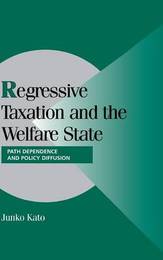
|
Regressive Taxation and the Welfare State: Path Dependence and Policy Diffusion
Hardback
Main Details
| Title |
Regressive Taxation and the Welfare State: Path Dependence and Policy Diffusion
|
| Authors and Contributors |
By (author) Junko Kato
|
| Series | Cambridge Studies in Comparative Politics |
|---|
| Physical Properties |
| Format:Hardback | | Pages:278 | | Dimensions(mm): Height 229,Width 152 |
|
| Category/Genre | Political economy |
|---|
| ISBN/Barcode |
9780521824521
|
| Classifications | Dewey:361.65 |
|---|
| Audience | | Professional & Vocational | |
|---|
|
Publishing Details |
| Publisher |
Cambridge University Press
|
| Imprint |
Cambridge University Press
|
| Publication Date |
1 September 2003 |
| Publication Country |
United Kingdom
|
Description
Political economists have viewed large public expenditures as a product of leftist government and the expression of a stronger representation of labor interest. The formation of governments' funding bases is a topic that has not been thoroughly explored, and this book sheds important new light on the issue of taxes and welfare. Beginning with a clarification of the development of postwar tax policies in industrial democracies, Junko Kato finds that the differentiation of tax revenue structure is path dependent upon the shift to regressive taxation. Kato challenges the conventional belief that progressive taxation leads to large public expenditures in mature welfare states.
Reviews"Too few political scientists have seriously examined the politics of taxation and the role it has in the political economy of modern states. Junko Kato's Regressive Taxation and the Welfare State bridges a major gap in understanding of the financing of the modern state. Her intriguing argument challenges the naive notion that progressive states must be financed through progressive taxes and in doing so, it makes an important contribution to the policy debate across the OECD." Sven Steinmo, University of Colorado "Recent theories of globalization have presented us with a very strong argument, namely that economic integration forces modern welfare states to converge. In this truly comparative and well-researched book, Junko Kato delivers an intriguing result. It is a genuinely counter-intuitive, yet very convincing argument about the importance of the institutional foundation of the taxation side of welfare states. In this, Kato successfully challenges several well-established theories in comparative politics. The puzzle she portrays and explains is theoretically important for our understanding of the increasing variation in size between modern welfare states." Bo Rothstein, Goteborg University "Overall, Kato provides a compelling mix of quantitative and qualitative data to equip the reader with some useful tools for considering what is at stake in the ongoing debate over the future of welfare state funding." Journal of Sociology and Social Welfare
|